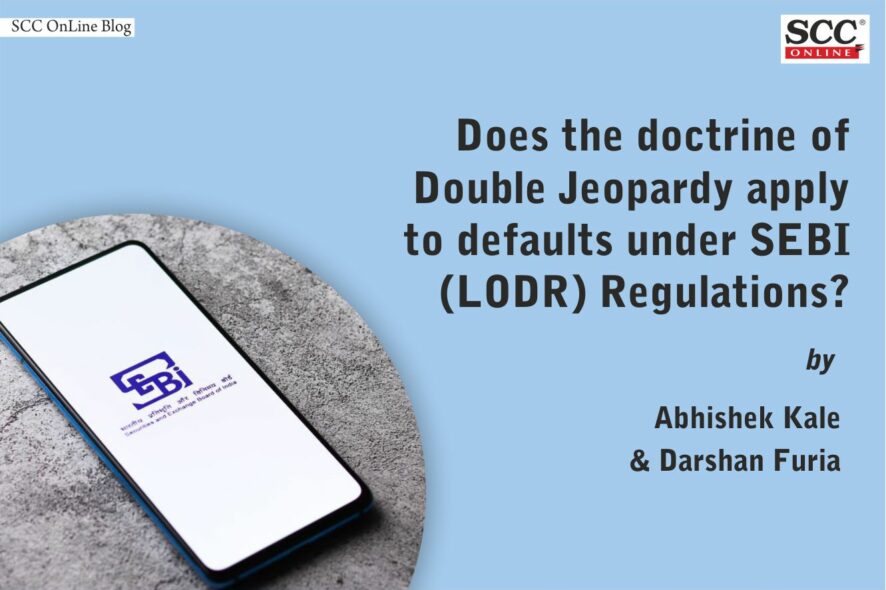The doctrine of ‘double jeopardy’ protects a person from being punished again for the same offence, following a valid conviction or acquittal. It emanates from the legal maxim ‘non bis in idem’, which translates literally from Latin as ‘not twice in the same thing‘.
This rule is well recognised under Indian law and even finds place in the fundamental rights guaranteed under our Constitution. Article 20(2) of the Indian Constitution states “No person shall be prosecuted and punished for the same offence more than once”. Likewise, Section 300 of the Code of Criminal Procedure, 1978 (“CrPC”) protects a person once acquitted or convicted, from re-trial for the same offence or on the same facts for any other offence. Section 26 of the General Clauses Act, 1897 further goes on to protect from double prosecution under two or more enactments, limiting the prosecution and punishment to any one of those enactments.
The landmark case on the subject is the case of Thomas Dana v. State of Punjab [1], wherein a Constitutional Bench of five Judges of the Supreme Court evaluated the three requirements for double jeopardy i.e., prosecution, punishment and same offence and held that if these three requirements are satisfied, then the protection under Article 20(2) of the Constitution is guaranteed.
However, the question of ‘identity of offence’ is one to be determined on the facts and circumstances of a particular case. In a recent decision, the Securities Appellate Tribunal (“SAT”) in the case of PVP Ventures Ltd. v. Bombay Stock Exchange Ltd.[2], has held that Bombay Stock Exchange (“BSE”) and National Stock Exchange (“NSE”) can separately impose a penalty for violations of Securities and Exchange Board of India (Listing Obligations and Disclosure Requirements) Regulations, 2015 (“LODR Regulations”). The penalty imposed was for non-compliance of provisions of Regulation 17 (Board of Directors) and Regulation 19 (Nomination and remuneration committee) of the LODR Regulations in two consecutive quarters.
The Appellant did raise a defence of double jeopardy and cited a former decision of Securities Appellate Tribunal (“SAT”).[3], wherein SAT considering this objection as a plausible one, referred this question to SEBI. In response to this, SEBI informed the Tribunal that it had considered the matter and took a conscious decision that separate penalties could be imposed by the stock exchanges. Following the suit, SAT has now diverged from its previous prima facie view. While making the reference to SEBI, SAT had observed that “the violation, if any, made by the appellant is of Regulation 17(1) of LODR Regulations. It is not a Stock Exchange based violation where each Stock Exchange would be within its right to impose a fine. Prima facie only one fine could be imposed and not two sets of fines by the Stock Exchanges. This aspect of a violation of the LODR Regulations, in our opinion, is required to be considered by SEBI.”
Justifying the double whammy, SEBI while deciding the reference held the issuer company accountable for making a conscious decision of listing on multiple bourses, which may also entail consequence such as penalties from each exchange. SEBI also observed that the LODR Regulations put in place a framework, where the primary responsibility for monitoring compliance was assigned to the stock exchanges. In terms of Regulation 97 of the LODR Regulations, recognised stock exchanges have been mandated to monitor the compliance with the provisions of the regulations, by entities listed on such exchanges. Exchanges have simultaneously been empowered to take action against listed entities for non-compliances, inter alia by way of penalties, suspension of trading activities, etc.
Pertinently, as per the regulatory requirements prescribed under both the Companies Act and securities law, entities are mandatorily required to seek listing only on any one stock exchange having country wide terminals. While listing on multiple bourses may include additional liquidity, visibility, access to more trading members, etc., it may assail multiple penalties in case of a default. Even in the regime of Listing Agreements, prior to the LODR Regulations, non-compliance would have assailed consequences under each such agreement.
What therefore emerges, is that the doctrine of double jeopardy is not applicable in case of actions by multiple exchanges under the LODR Regulations.
*Deputy Managing Partner, Naik, Naik & Company, Mumbai
** Senior Associate, Naik, Naik & Company, Mumbai
[3] W.S. Industries (India) Limited vs. BSE Ltd. 2019 SCC OnLine SAT 389






